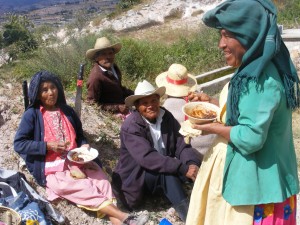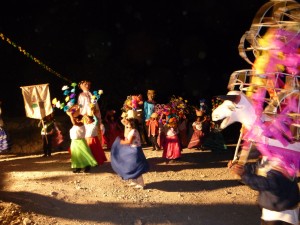 Having now reached our early 70’s, my wife, Kathy, and I find ourselves living on a mountainside in the small indigenous Mixtec community of San Isidro Yucuyoco in Oaxaca, Mexico. The massive pines and junipers that overshadow our mud and palm house, the fruit of 39 years of indigenous reforestation projects, give way below to steep slopes of eroded lands crisscrossed by recent contour ditches aimed at reversing centuries old erosion patterns. Across the valley the remains of an ancient Mixtec community dated from a few centuries BC, nestle among ancient oak forests, and below the forests we can see the colonial church towers of Santiago Tilantongo, famous for the 11th century reign of the king Ocho Venado whose story is told in some of the oldest extant codices in Mexico. The Mixtec campesinos of this small village have become a second family to us and given us the great privilege of joining in their democratic assemblies, their fiestas, their work, and their family and community struggles.
Having now reached our early 70’s, my wife, Kathy, and I find ourselves living on a mountainside in the small indigenous Mixtec community of San Isidro Yucuyoco in Oaxaca, Mexico. The massive pines and junipers that overshadow our mud and palm house, the fruit of 39 years of indigenous reforestation projects, give way below to steep slopes of eroded lands crisscrossed by recent contour ditches aimed at reversing centuries old erosion patterns. Across the valley the remains of an ancient Mixtec community dated from a few centuries BC, nestle among ancient oak forests, and below the forests we can see the colonial church towers of Santiago Tilantongo, famous for the 11th century reign of the king Ocho Venado whose story is told in some of the oldest extant codices in Mexico. The Mixtec campesinos of this small village have become a second family to us and given us the great privilege of joining in their democratic assemblies, their fiestas, their work, and their family and community struggles.
It has been a long journey-a lifetime journey- that has brought us here. It is a journey that has been rife with symbols and surprises: from middle class Midwest USA, to fascist Spain under Francisco Franco and on to the socialism of Saskatchewan, Canada, the birthplace of that country’s universal health care system. And the journey plumbed new depths in the inner city Puerto Rican and Mexican neighborhoods of Chicago and the Chicano communities of New Mexico. In some ways, we think, it has been a journey into the center of the human heart.
Joseph Conrad, in Heart of Darkness describes a different kind of heart journey. As his central character “descends” into darkest Africa, he finds the civilized European descending into barbarism- into a cynicism and darkness that he suggests, not without racist overtones given the geographical context he has chosen, is at the heart of human nature.
 The novelist and philosopher, Ayn Ryan, also purported to have plumbed the human heart and found it, at base, profoundly aggressive and violent. “When money ceases to be the tool by which men deal with one another, then men become tools of men. Blood, whips, and guns – or gold. Take your choice – there is no other,” she suggests in the “Hymn to Money” in Atlas Shrugged.
The novelist and philosopher, Ayn Ryan, also purported to have plumbed the human heart and found it, at base, profoundly aggressive and violent. “When money ceases to be the tool by which men deal with one another, then men become tools of men. Blood, whips, and guns – or gold. Take your choice – there is no other,” she suggests in the “Hymn to Money” in Atlas Shrugged.
Indeed, from within the translucent bubble of occidental thought and culture it is easy to conclude that greed, egoism and violence are at the heart of human nature. Yet San Isidro Yucuyoco seems to live outside the bubble. Here, in a way that seems indiscernible to the blurred vision of the occidental mindset, a strong sense of community responsibility and cooperation seems to outweigh the individualism and selfishness of the human heart. Elected village leaders regularly sacrifice a year of their lives in unpaid service to the community usually without complaint and with great responsibility. All major community decisions are reserved for democratic, all-community assemblies. Unpaid work days or tequios in which all the able bodied are expected to participate maintain or improve the village access road, school, and community buildings. Mutual aid and sharing in community fiestas are things that are valued more highly than individual accumulation. Such mutual aid arrangements at times of planting and harvesting when many hands are needed make the village economy function.
In Yucuyoco, in spite of its foibles, faults and squabbles, life suggests that the human heart is, at base, open and caring, responsible, friendly and sharing, and of course, sometimes devious. It is not that Yucuyoco is a special case, though. The values inherent in the village life of Yucuyoco are happily present to one degree or another in most of the indigenous communities of the Americas, and probably of Africa and Asia as well. But in Latin America perhaps more than elsewhere at the moment, these values are regaining their voice. From Peru to Bolivia and the southern states of Mexico where the majority of the population is indigenous, a new call has emerged for a different kind of society, a different economy and a different relationship of the individual and community to the Mother Earth. They are calling to an occidental heart that is eating itself up with a cynicism, a gross individualism and a greed that threatens the survival not only of western societies, but other cultures and the human support systems of the planet as well.
These indigenous communities challenge us to give up our cynicism about the possibilities of the human heart. They invite us to consider what it is to “live well”. They demonstrate to us ways to live together on the planet that are crucial to our survival as a human family. With what we have learned, they propose we take up anew with them the challenge to build the community politics, the community economics, and the community understanding of our role on the planet that can make us a sustainable and gentle presence here.
For that we will need to break out of the “bubble” and regain our faith in the possibilities of the human heart.
Phil Dahl-Bredine lives and works in Yucuyoco, Oaxaca. He is a contributor to the CIP Americas Program www.americas.org



